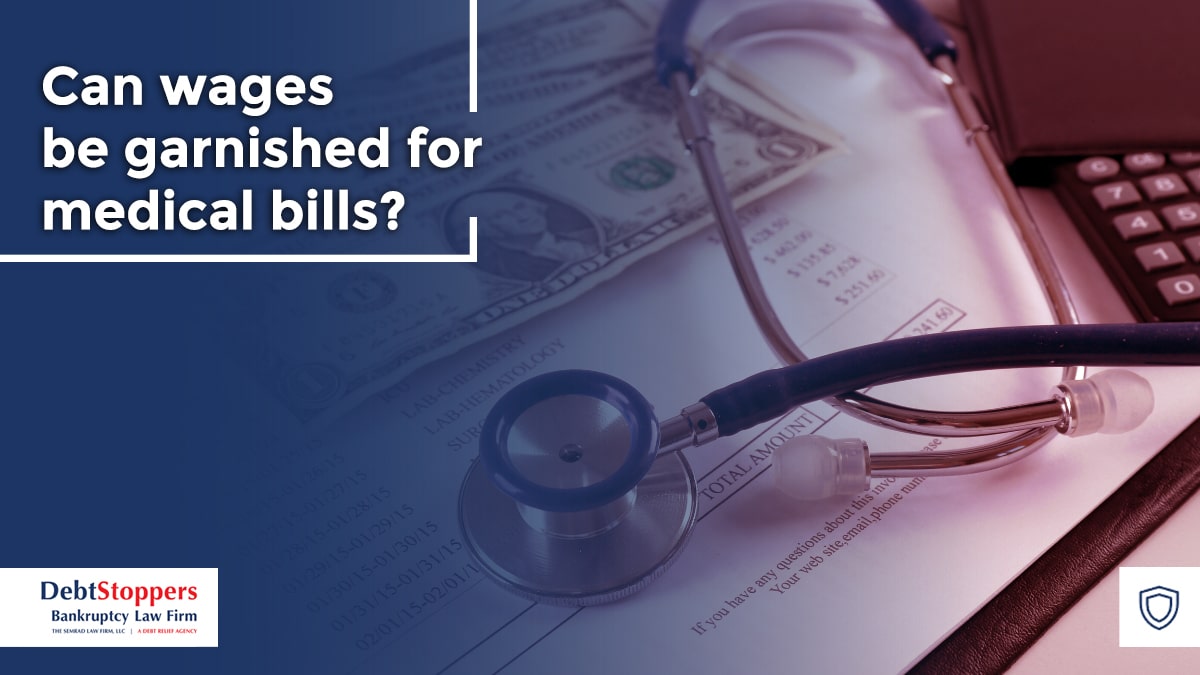Millions of Americans have unpaid medical bills and often wonder if their wages can be garnished for medical debt.
Wage garnishment is a legal process where a portion of an individual's earnings is withheld by their employer to pay off a debt. This process is typically initiated by a court order and involves the creditor obtaining a judgment against the debtor.
Wage garnishment can significantly impact a debtor's finances, making it essential to understand your rights and options for dealing with such situations. Seeking legal advice is often beneficial to navigate the complexities of garnishment laws and protect your income.

How does wage garnishment work?
For wages to be garnished, creditors must sue the debtor in court and obtain a judgment that specifies the amount owed. After receiving the judgment, the creditor requests a writ of garnishment from the court. The writ of garnishment is served to the debtor's employer, requiring them to withhold a portion of the debtor's wages.
The employer deducts the specified amount from the debtor’s paycheck. The withheld funds are sent to the creditor or the court, which then forwards the money to the creditor.
Garnishment continues until the debt is fully paid or the court orders otherwise.
Legally withholding from a paycheck for a reason
Several types of debt are potentially subject to wage garnishment including:
-
Medical bills can lead to garnishment if a creditor wins a judgment.
-
Credit card debt often results in wage garnishment if not paid.
-
Child support and alimony garnishments have different limits and can take a higher percentage of earnings.
-
The IRS and state tax agencies can garnish wages for unpaid taxes, sometimes without a court order.
-
Federal student loans can also be garnished, often without a court judgment.
It’s important to know that certain types of income, such as Social Security benefits, disability payments, and veterans' benefits, are generally exempt from garnishment. Additionally, debtors can sometimes file for a reduction in garnishment due to financial hardship.
What kind of medical bills should they be?
Almost any type of unpaid medical bill can potentially lead to wage garnishment if the creditor takes legal action and obtains a court judgment against the debtor.
Here are some of the common types of medical bills that can result in wage garnishment:
Hospital bills
Any costs associated with hospital visits, services, stays, surgeries, and treatments including emergency medical services and procedures.
Medical bills or visits
Any costs associated with medical appointments or office visits including physician and specialist fees, diagnostic services, imaging services, outpatient services, lab work, therapies, dental procedures, vision care, prescription medications, mental health treatment programs and facilities, chiropractic services, and alternative therapies such as acupuncture, massage therapy, and other alternative medical treatments.
Surgical fees and costs
Any costs for in-patient and out-patient surgeries performed by physicians, specialists, or other medical professionals.
How does wage garnishment for medical bills work?
Wage garnishment for medical bills is a legal process where a creditor can collect a portion of your wages directly from your employer to repay outstanding medical debt.
Before wages can be garnished, the medical service provider or collection agency must sue the debtor and obtain a court judgment. The debtor is notified of the lawsuit and can contest it in court.
Once a judgment is obtained, the creditor requests a writ of garnishment from the court. The writ is delivered to the debtor’s employer, instructing them to withhold a portion of the debtor's wages. The employer deducts the specified amount from the debtor’s paycheck. The withheld funds are sent directly to the creditor or to the court, which then forwards the money to the creditor.
The debtor will receive a notice from the court or employer about the garnishment order, including details of the amount to be garnished and how to contest it. The garnishment continues until the debt is paid off or the court orders otherwise.
The debtor will receive a notice from the court or employer about the garnishment order, including details of the amount to be garnished and how to contest it. The garnishment continues until the debt is paid off or the court orders otherwise.

How to Stop Wage Garnishment
If your wages are being garnished, there are a few ways to stop the garnishment.
if possible, pay the debt; payment of the debt will stop the garnishment.
If you cannot pay the debt in full, you may be able to negotiate a payment plan with the creditor.
Additionally, filing for bankruptcy can stop most garnishments through an automatic stay, except for certain debts like child support and alimony. It’s wise to consult with a bankruptcy attorney if wage garnishment creates significant financial hardship or if considering bankruptcy.
Can your disability check be garnished for medical bills?
Many people who receive Social Security Disability (SSD) benefits depend on those benefits to make ends meet. If they are faced with overwhelming or unexpected medical debt, they often worry if their SSD benefits can be garnished for unpaid medical bills. The answer is no; Social Security Disability benefits cannot be garnished for medical debt. Federal law protects SSD benefits from creditors, including those seeking payment of medical debt.
Even though your SSD benefits cannot be garnished for medical debt, it’s important to know that creditors may still take legal action against you to collect medical debt. If you’re facing unmanageable medical debt, it’s wise to talk to an attorney so you understand your options.
Can my pension be garnished for medical bills?
If you are retired and have medical debt, you might be wondering if your pension can be garnished for medical debt. The answer is no; your pension cannot be garnished directly. However, once the money is deposited into your account, creditors may be able to sue you for that money. However, the pension itself is protected from garnishment. This can get complicated quickly, so it’s wise to talk with an attorney and ensure you understand your rights.
Can social security be garnished for medical bills?
Simply put, Social Security Insurance (SSI) benefits cannot be garnished for medical debt. Federal law protects Social Security from garnishment for medical debt. Even though SSI cannot be garnished directly, it’s important to know that creditors may still take legal action against you to collect medical debt. To ensure you understand your options and your rights are protected, it’s wise to talk with an attorney.





